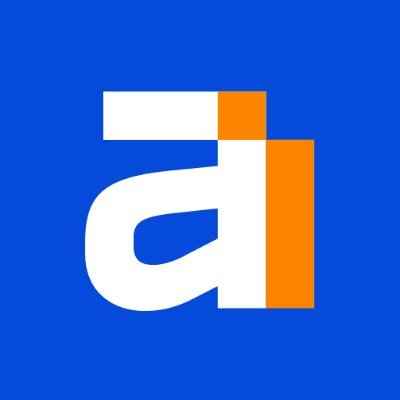Content Outline
Semrush vs Ahrefs: Overview
What is Semrush?
Semrush is an SEO tool that helps businesses understand and improve their website’s performance in search engines. It provides detailed information about competitors, keywords, backlinks, and the amount of traffic a website gets.
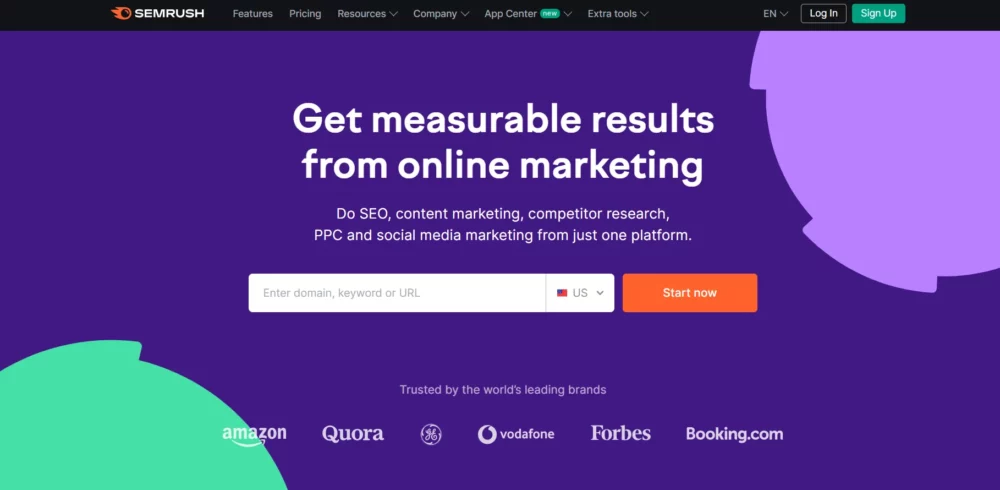
Semrush makes it easier for businesses to monitor their SEO progress and make smart decisions to increase their website’s visibility and attract more visitors. Its easy-to-use interface and ability to create customized reports make it suitable for both small and large businesses.
Pros:
- Offers a useful free version.
- Industry-leading SEO API.
- Includes extra tools like PageImprove and AI ImpactHero for content marketing.
- Clear pricing structure.
- Effective for local SEO, offering competitor insights and local keywords.
- Provides a Social Media Toolkit for analyzing social media performance.
- PageImprove feature allows on-page SEO improvements directly from the Chrome browser.
Cons:
- Some features are complex and not very user-friendly.
- It has a steeper learning curve compared to Ahrefs.
- Customer support is limited to weekdays and specific times; otherwise, email support is needed.
What is Ahrefs?
Ahrefs is a simple yet powerful tool for people working in SEO and digital marketing. It helps by providing information on things like backlinks and how well keywords are performing.
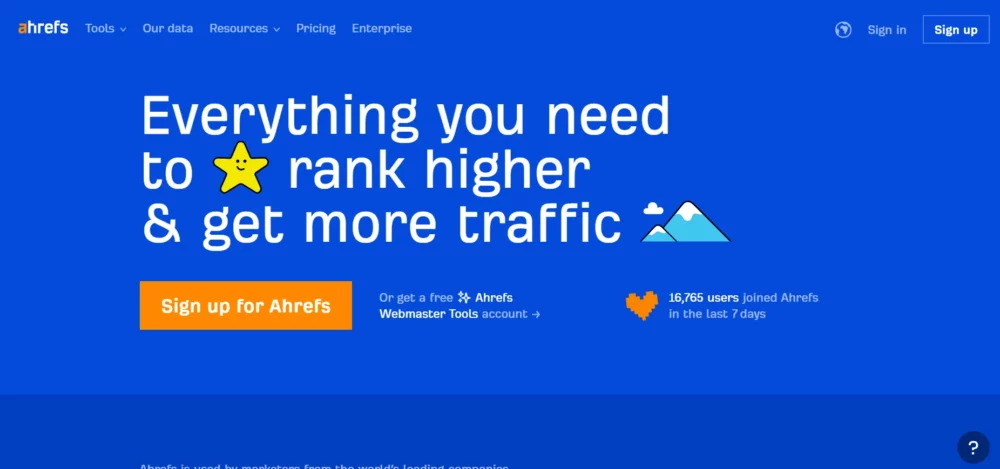
Ahrefs also lets you see what your competitors are doing so you can understand what works well for them. It has a big database and is easy to use, making it a valuable tool for anyone in digital marketing.
Ahrefs Pros
- Easier to use UI than Semrush
- Excellent customer support, with 24/5 support
- Largest backlink database of all platforms
- Track SERPs on other search engines such as Bing
- Constantly growing database of educational videos, even on their social media accounts
- Constantly updating their platform, with updated release notes posted on social media accounts
Ahrefs Cons
- There is no free trial or free plan
- The pricing tier system is easy to understand, but the credit system makes things complicated
- Google integration is only for advanced tiers and higher
| Feature | Semrush | Ahrefs |
| Supported Search Engines | Built around using Google’s Search Engine | Supports other search engines, as well as Google’s |
| Keyword Database Size | 21.1 billion keywords | 19.2 billion keywords |
| Content Marketing Platform | Has ImpactHero AI for content marketing | Does not have a similar feature |
| Mobile Rank Tracking | Offers tracking of SERPs on mobile devices | Also offers rank tracking of mobile SERPs |
| Outbound Link Analysis | Possible, but not a dedicated feature | Easy with Site Explorer to find inbound and outbound links |
| On-Page SEO Checker | Dedicated on-page SEO checker available | Free to use on-page SEO checker |
| SEO Content Template | Dedicated tool for creating SEO content briefs | Does not have |
| Website Audit | In-depth website auditing tool | Decent website auditing tool, but less comprehensive than Semrush |
| Backlink Audit | Includes a backlink auditing tool | Boasts one of the largest backlink databases |
| Social Media Toolkit | Provides insights into social media | No social media toolkit |
| PPC Keyword Tool | Focused on commercial keywords for PPC campaigns | No dedicated PPC keyword tool, but can create a PPC report |
| Local SEO | Excellent Local SEO platform with SEO score and local keyword suggestions | Lacks Local SEO features |
| Market/Trends Explorer | .Trends feature offers marketplace insights, traffic analytics, and more | Does not have marketing tools |
| Free Trial | 14-day free trial available | No free trial |
Semrush vs Ahrefs – In-Depth Feature Guide and Comparison
Let’s now examine how each tool works, how they compare, and how they compare to Semrush and Ahrefs in greater depth.
Rank Tracking Comparison
Semrush
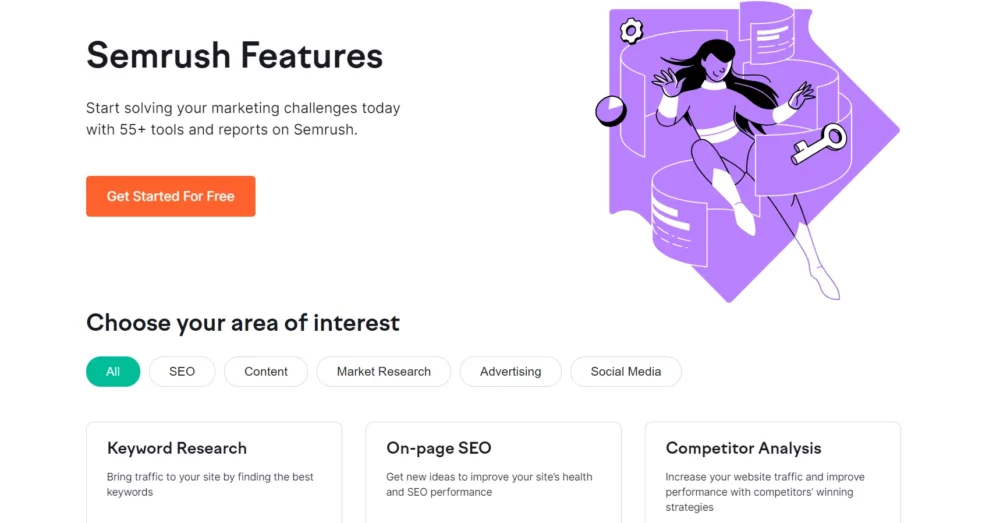
Semrush’s position tracking tool is user-friendly and focuses on making it easy to track your chosen keywords. Here’s what it offers:
- Daily Keyword Ranking Updates:
It keeps you updated daily about how your selected keywords are performing in search rankings.
- Local-Level Data:
The tool provides information about keyword search volumes at a local level, which is great for understanding local SEO performance.
- Search Features and Share of Voice (SoV):
It shows the percentage of special search results (like featured snippets) that your website appears in. Plus, they introduced a metric called Share of Voice in 2020, available in their business tier, which helps measure the real impact of your SEO efforts.
- Competitive Analysis:
The tool identifies your main competitors based on search engine results pages (SERPs) and helps you understand how you stand against them. This is helpful for tweaking your SEO strategy to stay ahead.
- Performance Across Devices and Featured Snippets:
You can also see how your site is doing on different devices (like mobiles and desktops) and in featured snippets, which are special boxes that appear at the top of some search results.
Ahrefs
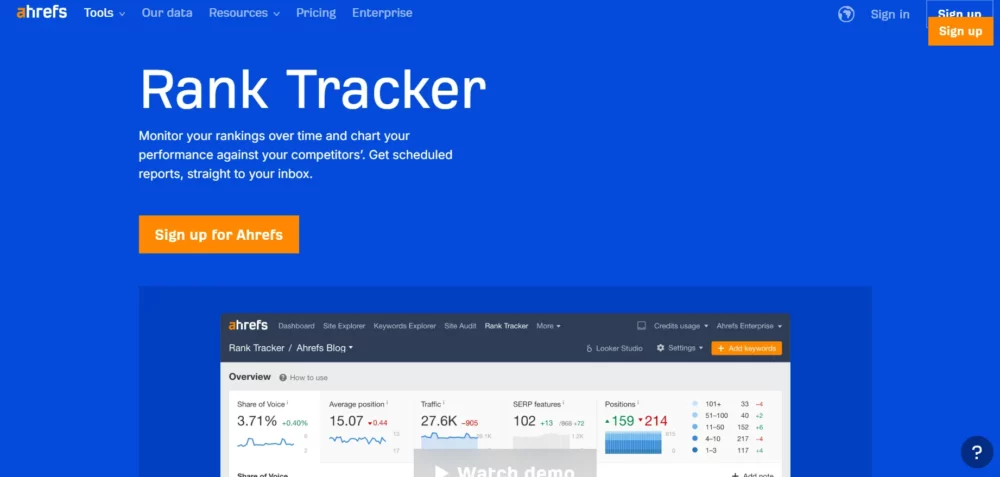
- Global Tracking:
Ahrefs helps you see how your website is ranking in different countries, covering up to 170 countries.
- Tracks Multiple Search Engines:
Unlike Semrush, which mainly focuses on Google, Ahrefs can check your website’s ranking on various search engines like Bing and Amazon. This is a big plus if you want to know how your site is doing beyond Google.
- Easy-to-Understand Dashboard:
It has a user-friendly dashboard that shows you key information like how visible your website is in search results, its average ranking position, and the amount of traffic it’s getting.
- Keyword Tracking and History:
You can track specific keywords to see how they are ranking over time. Ahrefs also shows the top 100 search results for each of your keywords on Google.
- Compare with Competitors:
It lets you see how your keywords are doing compared to your competitors. You can see which keywords you have in common and how well you rank for these compared to them. This is helpful because it can give you ideas on how to improve your rankings.
Why Semrush Wins:
The main advantage of Semrush over Ahrefs is its daily update frequency, allowing users to get more current data about their keyword rankings.
While Ahrefs offers broader search engine coverage, Semrush’s detailed and frequent updates make it more appealing for users who prioritize up-to-date information and in-depth analysis for Google searches.
Keyword Research Comparison
Semrush offers a robust suite of tools for keyword research, helping you find the right keywords, understand how competitive they are, and monitor their performance over time.
It’s particularly useful for getting detailed, up-to-date insights and managing a wide range of keywords effectively.
Semrush’s Keyword Research Tools:
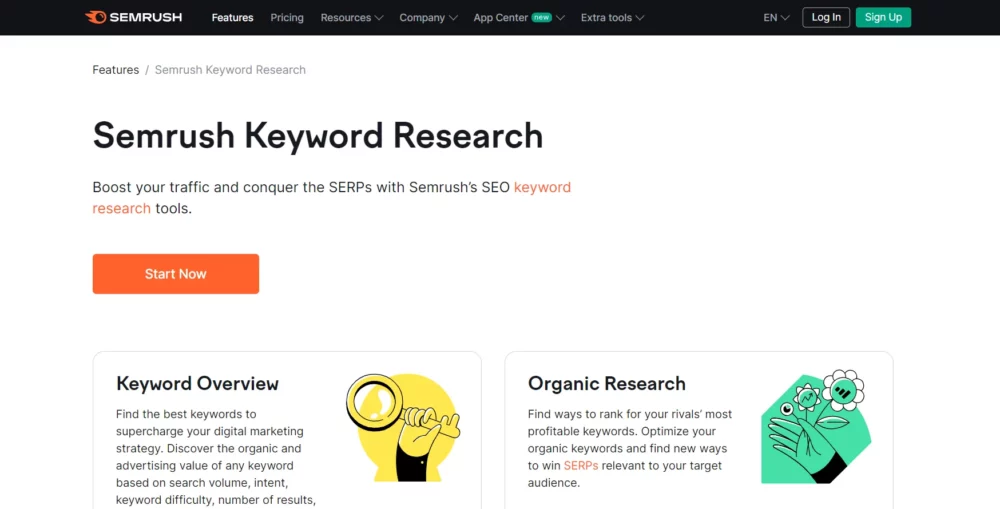
1. Keyword Overview:
- What It Does: This tool gives you a detailed look at specific keywords you’re interested in.
- How to Use: Just enter the keyword and select a country.
- What You Get: Information like search volume (how many people are looking for this keyword), difficulty (how hard it is to rank for this keyword), cost per click (CPC) for ads, global search volume, and current trends.
- Special Features: Shows the top 100 websites ranking for that keyword and the history of ads using that keyword. The key benefit is that Semrush regularly updates its data, so you’re always working with the latest information.
2. Keyword Magic Tool:
- What It Does: Helps you discover new, related keywords.
- How to Use: Enter a ‘seed’ keyword (a basic keyword idea you start with).
- What You Get: Access to over 20 billion keywords, making it one of the largest databases out there. It also groups related keywords together (keyword clustering), making it easier to explore and pick the best ones for your content.
- Special Features: Shows detailed info for each keyword, like volume, trend, difficulty, CPC, competition, and SERP features (special results like featured snippets).
3. Keyword Manager:
- What It Does: A place to save and manage your favorite keywords.
- How to Use: When using the Keyword Magic Tool, you can add keywords to this manager with a simple click.
- What You Get: A central place to view all your chosen keywords and their metrics. You can export this data to other Semrush tools or download it as XLSX or CSV files.
4. Keyword Difficulty:
- What It Does: Helps you understand how tough it would be to rank for a specific keyword.
- How to Use: Enter the keyword to see its difficulty score.
- What You Get: Info like volume, results, trend, and sources of the SERP. It also reveals which domains are your competitors for that keyword.
- Special Features: You can analyze up to 10 keywords at a time and export the data.
5. Organic Traffic Insights:
- What It Does: Gives you a comprehensive view of your website’s organic (non-paid) performance in search engines.
- How to Use: It combines data from Google Analytics, Google Search Console, Google Keyword Planner, and Semrush in one dashboard.
- What You Get: An integrated view that helps you monitor and understand your website’s organic search performance better.
Ahrefs Keyword Research Tools:
1. Keyword Explorer:
- What It Does: This tool helps you find new keyword ideas based on the primary keyword you enter.
- How to Use: Choose a search engine, enter a primary keyword, and the tool will generate a list of related keyword ideas.
Features:
- Ranking Difficulty: Shows how hard it is to rank for a chosen keyword.
- Backlink Requirement: Estimates the number of backlinks needed to rank in the top 10 for that keyword.
- Search Volume and Clicks Data: Provides data on how many people are searching for the keyword and the percentage of clicks it receives.
- Organic vs Paid Clicks: Breakdown of clicks between organic and paid search results.
- Parent Keywords: Suggests broader topics you can target.
- Click Potential: Estimates the potential clicks if you rank for that keyword.
- Special Advantage: Unlike Semrush, Ahrefs offers keyword data for 10 different search engines including Google, YouTube, Amazon, and Bing.
2. Organic Keywords:
- What It Does: This feature focuses on analyzing what keywords your competitors are ranking for.
- How to Use: Enter the domain name of your competitor, and the tool will show you the keywords they rank for.
Features:
- Competitor Keyword Data: Shows keywords your competitors rank for in different countries.
- Keyword Metrics: Provides search volumes, keyword difficulty, CPC, traffic, and the websites ranking highest in the SERPs for these keywords.
- Recent Updates:
Individual Keyword Metrics: Now you can see metrics for a single keyword or a list of keywords.
Search Volume History: Offers historical search volume data for individual keywords.
Country-Specific Search Volumes: Shows search volumes for individual keywords broken down by country.
Overall winner – Semrush
while Ahrefs is also a powerful tool with its own strengths (like a strong backlink database and keyword data across multiple search engines).
Semrush’s keyword research capabilities are often considered superior due to their comprehensive nature, depth of insights, and integration with a broader suite of SEO tools.
However, the best choice can vary depending on specific user needs, budgets, and the scope of their SEO projects.
Technical SEO Site Audit Comparison: Semrush Vs Ahrefs
Semrush Site Audit Feature:
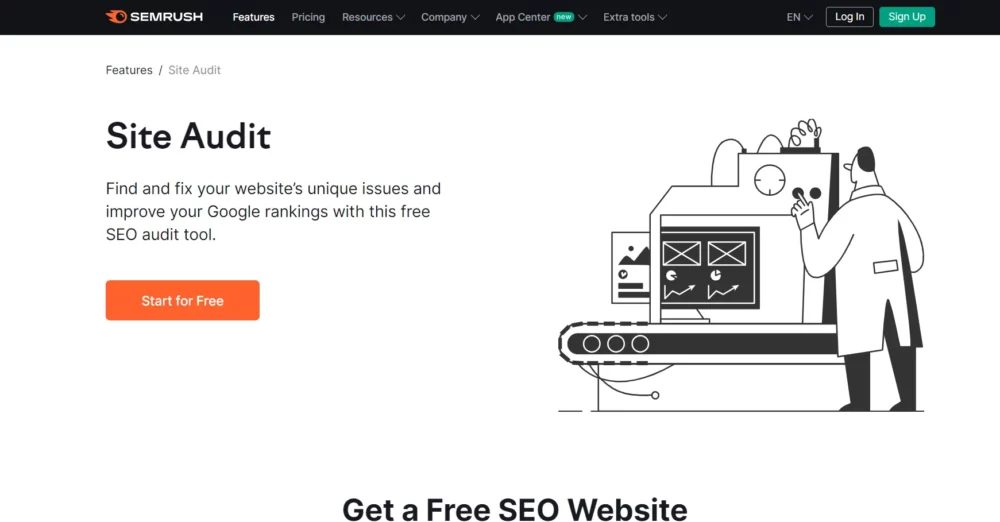
1. Overall Health Score:
- What It Is: Semrush’s Site Audit gives your website a health score out of 100.
- How It Helps: This score quickly tells you the overall condition of your website from an SEO perspective. A higher score means fewer issues.
2. Identification of Errors, Warnings, and Notices:
- Error Detection: The tool categorizes issues into errors (major issues), warnings (less critical issues), and notices (informative tips).
- Benefits: By categorizing issues, it helps you prioritize what needs to be fixed first, ensuring the most critical problems are addressed promptly.
3. Deep Dive into Specific Online Marketing Issues:
- In-Depth Analysis: The tool allows you to explore specific SEO issues in detail.
- Advantage: This helps you understand exactly what’s wrong and how to improve your website’s technical SEO, leading to better search engine rankings.
4. Crawling Insights:
- Functionality: Shows which pages have been crawled and assesses the crawlability of your website.
- Importance: Understanding how search engines crawl your site can highlight issues that may be preventing your site from being properly indexed.
5. Detailed Issue Reports:
- Issue Identification: The tool points out specific issues such as broken links, missing alt tags, or slow-loading pages.
- Benefits: Knowing these specific issues allows you to make targeted improvements to enhance your site’s performance and SEO.
6. Analysis of Technical Aspects:
- Features: It covers various technical aspects like markup implementation, crawl depth, HTTP status codes, canonicalization, internal linking, and AMP (Accelerated Mobile Pages) links.
- Why It Matters: These technical elements are crucial for SEO. For example, proper canonicalization prevents duplicate content issues, and efficient crawl depth ensures all important pages are indexed.
7. Actionable Recommendations:
- Guidance Provided: Semrush not only identifies issues but also suggests ways to fix them.
- Result: You get a clear action plan for improving your site’s SEO performance.
Ahrefs’ Site Audit Feature:
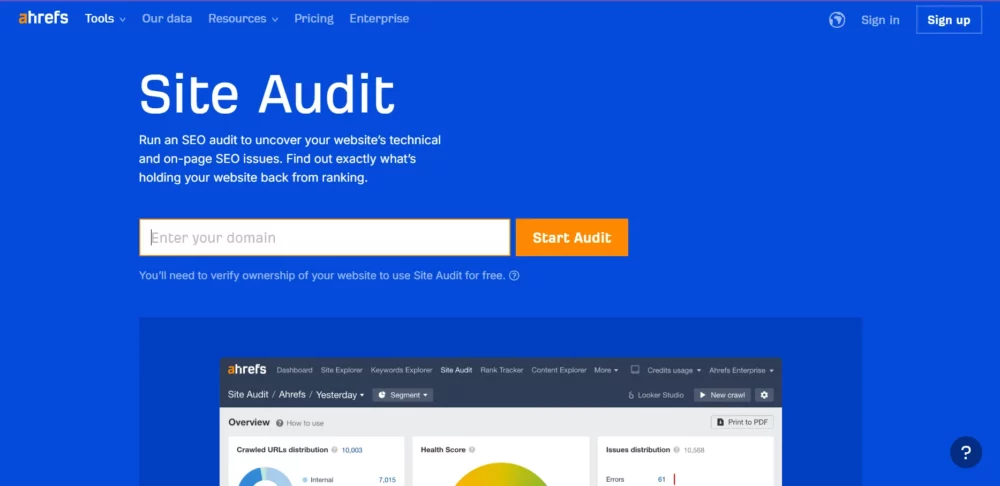
1. Overview of Your Website’s Health:
- What It Does: Ahrefs gives your website an SEO score which represents its overall health in terms of search engine optimization.
- How It Helps: This score lets you quickly understand the general SEO condition of your site.
2. Detection of SEO Issues:
- Analysis Performed: The tool scans your website for over 100 common SEO issues.
- Benefit: By identifying these issues, you know what problems need fixing to improve your website’s SEO performance.
3. In-Depth Recommendations:
- Guidance Provided: Ahrefs offers recommendations on how to address the identified issues.
- Note: While these recommendations are helpful, they might not be as detailed as those provided by Semrush.
4. Focus on Specific Issues:
- Detailed Inspection: You can delve into particular areas like site performance, HTML tags, social tags, content quality, etc.
- Advantage: This allows you to focus on specific aspects of your website that need improvement.
5. Customizable Filters:
- Functionality: The tool provides various filters to narrow down the data you see.
- Why It’s Useful: You can tailor the audit results to focus on the exact types of issues or areas you’re most interested in improving.
The overall winner is Semrush. Here, the SEO site audit tool crawls a website and reports any technical SEO issues it may have. In addition to ranking a website’s overall SEO health, it will also offer solutions and recommendations for fixing some issues.
Thus, Semrush I found a winner in this category too.
Competitor Research Tools: Ahrefs vs Semrush
Semrush’s Competitor Research Tools:
1. Overview of Tools:
Semrush’s competitive research is comprised of several tools: Domain Overview, Traffic Analysis, Organic Research, Keyword Gap, and Backlink Gap.
2. Keyword Gap Tool:
- What It Does: This tool allows you to compare your website’s keywords with up to five competitors.
- Key Feature: Its standout feature is the intuitive Venn diagram that visually represents which keywords are common between you and your competitors and which are unique.
- Additional Insights: You get essential data like keyword volume and the keywords your competitors are using that you aren’t.
- Benefits: It provides a quick, at-a-glance understanding of your competitive keyword landscape and reveals areas where you might be missing out.
Ahrefs’ Content Gap Tool:
1. Basic Functionality:
Similar to Semrush, Ahrefs allows you to compare your site’s keywords with those of up to five other domains.
2. Key Differences:
Presentation of Data: Ahrefs provides a list of keywords with some metrics but lacks the visual overlap representation seen in Semrush.
Insights Offered: It shows a keyword overlap graph and identifies weak keywords that aren’t ranking well compared to your competitors.
Why Semrush is Often Considered the Overall Winner:
1. Comprehensive Analysis:
Semrush provides a more in-depth analysis of the competitive landscape. Its tools, particularly the Keyword Gap tool, give a clearer picture of where you stand in relation to your competitors.
2. User-Friendly Interface:
The visual representation (Venn diagram) in Semrush makes it easier for users to quickly grasp the keyword overlap and gaps.
3. Broader Range of Tools:
Semrush has a dedicated section for competitive research, offering a wider array of tools than Ahrefs, which gives users more angles to understand their competition.
4. More Detailed Data:
With Semrush, you not only see which keywords are common or unique but also get key metrics like search volume for each keyword.
Summary:
Both Semrush and Ahrefs offer tools to compare your website’s keywords with those of your competitors.
Semrush’s Keyword Gap tool, in particular, provides a more detailed and easily interpretable overview of how your keyword strategy stacks up against your competitors, making it a valuable asset for anyone looking to gain a competitive edge in SEO.
Backlink Tools: Semrush vs Ahrefs
Semrush’s Backlink Tools:
1. Backlink Analytics:
- Purpose: Helps you explore the backlink profiles of any website.
- Features: Shows traffic, referring domains, types of backlinks, anchor texts, and more.
- Deep Dive: You can analyze authority scores, follow vs. no-follow links, and geographical sources of backlinks.
2. Backlink Audit:
- Function: Assesses your website’s backlinks for quality.
- Toxic Score: Assigns a ‘toxic score’ to links based on various factors, helping identify harmful backlinks.
- Actionable: Allows you to audit, remove, or disavow bad links to avoid penalties from search engines.
3. Backlink Gap:
- Use: Compares your backlink profile with up to 4 competitors.
- Benefit: Helps identify new link-building opportunities by showing where competitors are getting backlinks from.
4. Link Building Tool:
- Strategy: Assists in actively building backlinks.
- Functionality: Suggests potential websites for backlinking based on target keywords, and tracks your outreach efforts.
5. Bulk Analysis:
- Capability: Allows for a quick overview of backlink profiles for up to 200 domains simultaneously.
Ahrefs’ Backlink Tools:
1. Site Explorer:
- Purpose: Investigates who’s linking to any given site or page.
- Details: Offers data like Domain Rating (DR), URL Rating (UR), inbound/outbound links, and anchor texts.
- Traffic Insight: Shows the traffic of the linking pages, aiding in prioritizing outreach efforts.
2. Content Explorer:
- Versatility: Used for finding content ideas and backlink opportunities.
- Function: Identifies pages with many backlinks and broken links, guiding towards topics that attract backlinks.
3. Batch Analysis:
- Quick Overview: Provides backlink metrics for up to 200 URLs at once.
- Limitation: Offers basic data like domain rating and number of backlinks without deep analysis.
4. Free Backlink Checker:
- Accessibility: Ahrefs offers a basic free tool showing authority score and backlink count.
Why Semrush is Often the Winner:
Comprehensive Tools: Semrush offers a wider range of specialized backlink tools, each serving a specific purpose, from analysis to active link building.
In-Depth Analysis: Provides detailed insights into backlink profiles, including advanced metrics and toxic link identification.
User-Friendly Interface: Despite the depth of data, Semrush’s tools are designed to be comprehensible, even to less experienced users.
Proactive Link Building: The Link Building Tool in Semrush goes beyond analysis, actively aiding in acquiring new quality backlinks.
Speed and Coverage: Post-2022 updates, Semrush can crawl a vast number of pages daily, ensuring up-to-date and comprehensive backlink data.
Free Trials Comparison
Semrush and Ahrefs are tools that help people with their websites and online marketing. Semrush gives you a chance to try their more advanced plan for free for 14 days. They also have special codes and links that other websites use to offer free trials.
Ahrefs used to let people try their tool for a week, but they don’t do that anymore. The only way to try Ahrefs now is to pay for a monthly subscription, but you can cancel it if you don’t like it.
So, right now, Semrush is the better choice because they offer a longer free trial and more options to try their tool for free.
Pricing Plans Comparison
Semrush offers three different pricing tiers for their services:
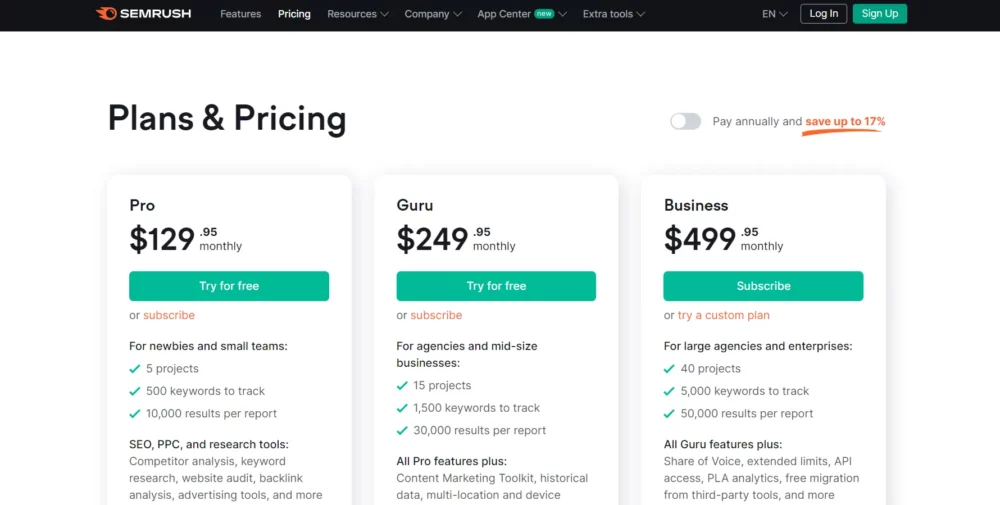
-
Pro Plan:
This plan costs $129.95 per month. With the Pro Plan, you get access to most of Semrush’s tools, except for the content marketing platform, which is only available in the Guru and Business plans.
-
Guru Plan:
Priced at $249.95 per month, the Guru Plan includes all the tools available in the Pro Plan and also offers additional features. For instance, it allows you to track the performance of up to 20 different domains.
-
Business Plan:
The Business Plan is the most expensive option, priced at $499.95 per month. It provides access to all of Semrush’s tools, including the content marketing platform. With this plan, you can track the performance of up to 50 different domains.
The key difference between these plans lies in the number of domains you can monitor and access to the content marketing platform. The higher the plan, the more domains you can track and the more features you can utilize.
On the other hand, Ahrefs offers four pricing tiers:
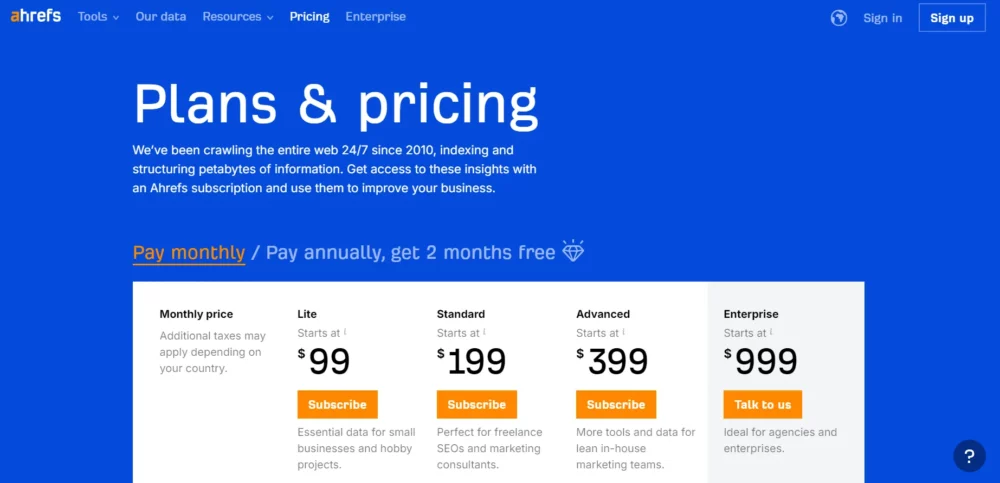
-
Lite Plan:
This plan costs $99 per month. Ahrefs uses a points-based system for its tools, but with the Lite Plan, you get a power user account that grants you 500 credits per month. This plan is suitable for basic users.
-
Standard Plan:
Priced at $199 per month, the Standard Plan offers more credits for your usage and access to various Ahrefs tools. It’s suitable for those who require more advanced features.
-
Advanced Plan:
The Advanced Plan costs $399 per month. It provides even more credits and access to additional tools, making it suitable for professionals and businesses with greater needs.
-
Enterprise Plan:
The most comprehensive plan is the Enterprise Plan, which costs $999 per month. This plan is designed for large businesses and offers a substantial number of credits and access to all available Ahrefs tools.
Ahrefs’ unique feature is its points-based system, where certain actions or tool usage consume credits. The rank tracker and site audit tools do not consume credits. The more advanced the plan, the more credits you receive, allowing you to perform more actions and utilize more features within the tool.
Pricing Winner
Ahrefs has a few free tools, but they are quite limited, especially when compared to Semrush’s free version. With Ahrefs’ free tools, you can do basic things like checking the health of your website and finding some important issues. You can also do some basic keyword research and check your backlinks.
However, Semrush is the better choice in this area because they not only offer a 14-day free trial of their advanced Pro plan but also have a free version with more features. So, overall, Semrush provides more value for free.
Customer Support: Ahrefs vs Semrush
Semrush provides customer support through email and an online form. They also have call centers around the world for phone support, but you can only call them on weekdays from 10:00 AM to 6:00 PM (EST/EDT).
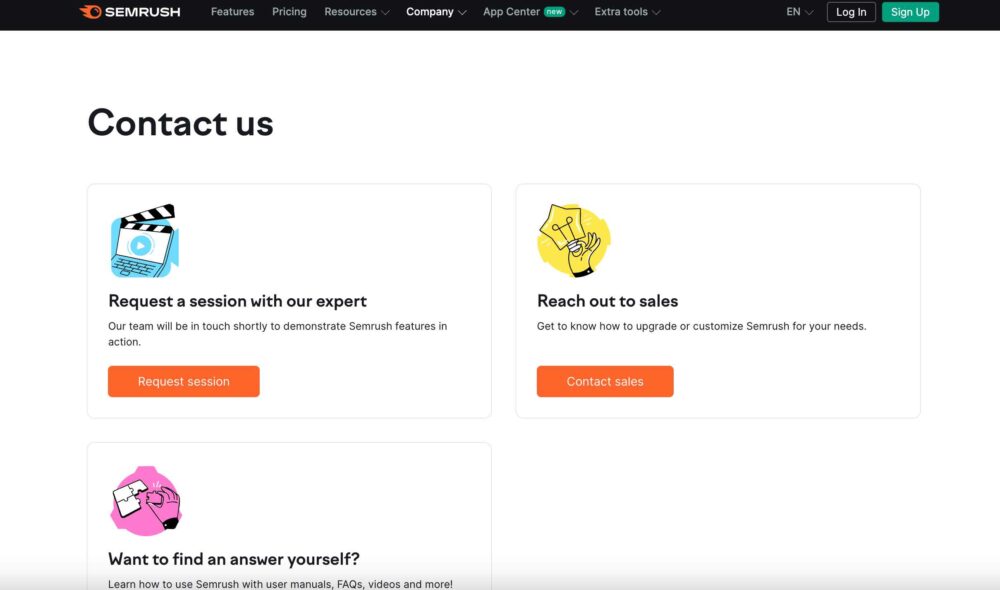
Ahrefs offers customer support that is easy to access from their website, and you can reach out to them anytime during the workweek (Monday to Friday), except on weekends.
Overall, Ahrefs wins in this comparison because they provide faster and more accessible customer support compared to Semrush.
| Tool/Feature | Semrush | Ahrefs |
| Social Media Toolkit | Includes social media inbox, analytics, and tracker. | Not mentioned as a specific feature. |
| SEO Chrome Extension Toolbar | Provides a quick SEO audit of any webpage you’re on. | Not mentioned as a specific feature. |
| Content Marketing Toolkit | Includes SEO writing assistant, SEO content template, and brand monitoring. | Not mentioned as a specific feature. |
| Link Intersect | Helps you find sites that link to your competitors but not to you. | Not mentioned as a specific feature. |
| PageImprove (Chrome Extension) | Allows you to find and correct on-page SEO problems within your Chrome browser. | Not mentioned as a specific feature. |
| Batch Analysis | Enables you to gather crucial SEO information on up to 200 URLs simultaneously. | Not mentioned as a specific feature. |
In this comparison, Semrush offers a variety of additional tools such as the Social Media Toolkit, SEO Chrome Extension Toolbar, Content Marketing Toolkit, Link Intersect, PageImprove (Chrome Extension), and Batch Analysis. These tools are designed to enhance your SEO and marketing efforts.
Ahrefs, on the other hand, may have some similar functionalities but they are not specifically mentioned as individual features. It’s important to note that both platforms provide a wide range of tools and features, and the choice between them may depend on your specific needs and preferences.
Quick Links:-
Which is Right for You? Semrush vs Ahrefs 2026
In my opinion, after looking at the comparison, I would lean towards Semrush as the better choice. That doesn’t mean Ahrefs is a bad tool; they both have their strengths.
However, when you take into account factors like pricing, the availability of a free trial, and overall functionality, Semrush seems to offer more bang for your buck.
One big advantage with Semrush is their 14-day free trial, which allows you to test their features without committing to a subscription right away.
In contrast, Ahrefs doesn’t provide a trial or money-back guarantee, so you have to shell out at least $99 for a monthly subscription just to give it a shot.
Another thing I appreciate about Semrush is its scalability. While it has extra features that might not be useful for everyone initially, these tools can become handy as your business grows and your needs evolve.
To sum it up, in my view, Semrush offers a solid feature set and better overall value. However, it’s worth considering Ahrefs if you have specific requirements and are willing to make an upfront investment without the option of a trial.


